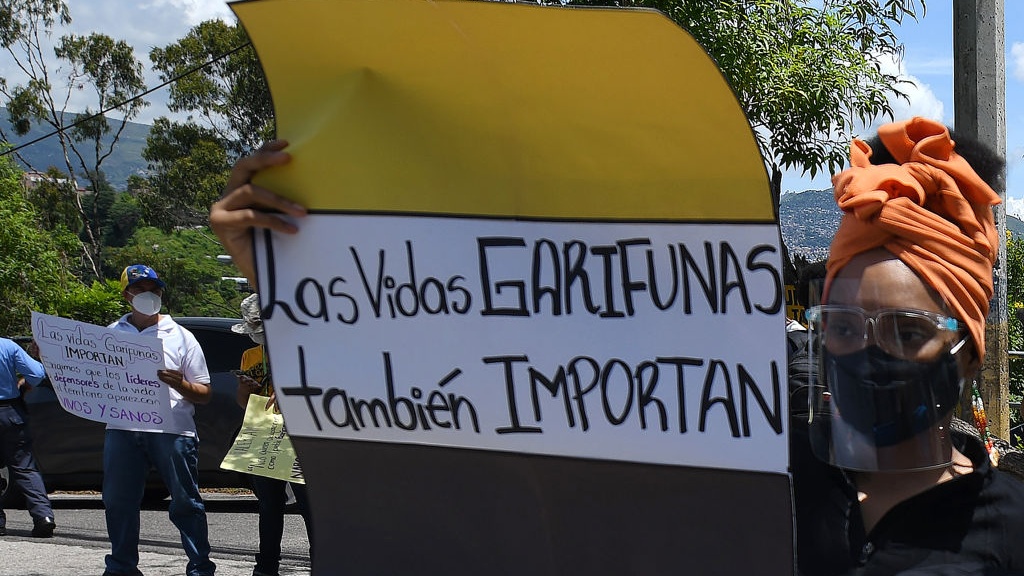A Honduran community is outraged over the abduction of four Black Indigenous men who were taken from their homes by gunmen in police uniforms.
According to The Guardian, witnesses say men with guns wearing face coverings arrived in the town of Triunfo de la Cruz in the early morning of July 19 in three different vehicles. The gunmen went into the homes of the men and forced each of them out before fleeing the scene. None of the vehicles carried license plates.
The four men captured are fishermen from the Afro-Indigenous Garifuna community. The Garifuna people, also called the Garinagu, are the descendants of Afro-Indigenous people from the island of St. Vincent who were exiled in the 18th century and migrated to Belize, according to the Minority Rights Group.
The abducted men have been described as “land defenders” by Democracy Now, or a group of people who speak up on environmental issues on behalf of their communities. Local leaders said the kidnappings illustrate the government's lack of concern for the Garifuna community.
According to The Bay State Banner, for decades, large mining companies and other businesses have disrupted the Garifuna community by intimidating, threatening and even killing activists who have tried to stop their land projects. Since President Manuel Zelaya was overthrown in 2009, activists say corporations and drug cartels alike have increased their activity and intimidation.
On July 21, protesters were seen gathering in Tegucigalpa, Honduras, to demand the men's safe return in video captured by Al Jazeera.
"We have been demanding that the Honduran state respect Black people in Honduras," one protester said.
Local leaders believe the environmental activists were targeted by the government. Al Jazeera pointed out that in 2017, Honduras was named one of the most dangerous countries for environmental activists by Global Witness.
Alberth Snider Centeno Thomas, 27, is the president of the community board and a semi-pro soccer player. He is also a territorial rights activist who reported threats prior to his abduction. Centeno Thomas assisted efforts to force the Honduran government to compensate Garifunas for stolen land and issue titles to end forced evictions, per a ruling from the Inter-American Court of Human Rights in 2015.
Suami Aparicio Mejía, 29, and Junior Rafael Juarez Mejia, 33, were among the men taken. Also seized was Milton Joel Martínez Álvarez, 39, reports The Guardian.
There hasn’t been any word from any of the men since they were abducted, The Guardian reports. An anonymous senior prosecutor said local authorities are still searching for a motive and that the investigation remains open.
“We are under constant threat by those who want our land and natural resources,” Jenny Ramona Herrera Álvarez, a Triunfo de la Cruz community member, said. “We do not want our brothers to be just another murder statistic. They were taken alive, we want them back alive.”
Miriam Miranda, a leader from the Black Fraternal Organization of Honduras, demanded the justice system hold the people who ordered the abduction as accountable as those who executed it.
“What happened on Saturday shows that powerful people who have illegally taken control of our territory are emboldened by the state’s contempt for the international court ruling. Justice means prosecuting those who ordered this crime,” Miranda said.
The abduction of the Garifuna men is the latest assault on the community following the death of Punta Piedra leader Antonio Bernardez, 71, who was murdered on June 17.
Antonio Bernardez, a Garifuna defender, was murdered this week in the community of Punta Piedra. #BlackLivesMatter in Honduras, in the US, and in every other country in the world. https://t.co/FHFiaobVmu
— Jalileh García (@jalilehg) June 22, 2020
“The Honduran state created the context for conflicts by violating the community’s territorial rights over years, and subsequently failed to comply with the IACHR order, which has aggravated conflicts,” Joseph Berra, director of the human rights in Americas project at the UCLA School of Law, said. “The Honduran state is directly responsible for these aggressions against the Garifuna community.”
In March 2016, Indigenous activist Berta Cáceres became a high-profile victim of environmental terrorism after she was assassinated for her work lobbying against an internationally funded dam. She was shot down in her bedroom by a team of gunmen.
